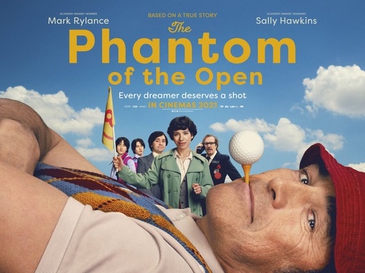Nicola Ryan reviews The Phantom of the Open, the third feature film from Craig Roberts recounting the unlikely true story of golfing underdog Maurice Flitcroft.
Showing at the London Film Festival Gala is a huge honour usually reserved for the biggest films sure to draw press. However, one Gala slot is also reserved for Empire Magazine’s choice – and this year they selected Craig Roberts’ third feature The Phantom of the Open. The film follows the life of Maurice Flitcroft (played impeccably by Oscar-winner Mark Rylance), a man who was once dubbed the worst golfer in the world. After Maurice spontaneously decides that he wants to play golf professionally, he enters the British Open having never played a round in his life, thus setting the stage for ensuing hilarity. The film inevitably explores the fallout from this decision – the effect it has on Maurice, his family, and the surrounding community to boot. The result is one of the most charming films of the year; a grounded story which positions a working-class man as a national hero.
Welsh actor Craig Roberts is no stranger to the director’s chair having previously directed Just Jim (2015) and Eternal Beauty (2019). It’s clear that Roberts thrives in telling stories about outsiders and underdogs, making Maurice Flitcroft the perfect subject for his latest project. The script comes from Simon Farnaby and is adapted from his book The Phantom of the Open: Maurice Flitcroft – The World’s Worst Golfer (co-written with Scott Murray). The passion and respect Farnaby has for the true story is central to the film’s success. Roberts’ directorial approach sees the film flit between a realistic, humdrum depiction of the average working man’s life interspersed with dreamscape imagery of Maurice golfing, bridging an unlikely fantasy later turned reality. It’s an emotional journey which Roberts guides the audience through deftly, balancing the thrill of Maurice’s sanguine cheer at, technically speaking, poor performances with the rife classism he faces in a space populated by the affluent mainstays of golfing circles. Maurice’s position as an outsider is as much about his background as his ability (or lack thereof) – with the golfing community viewing his presence as something which might tarnish the reputation of the sport.
Mark Rylance is a stellar actor and an apt choice for Maurice Flitcroft, he brings nuance to a character who could feel clumsy or slapstick, rendering him, instead, human (and his palpable joy in playing the role doesn’t hurt, either). In support, Sally Hawkins takes the role of Maurice’s wife, Jean Flitcroft. A scene-stealer at the best of times, Hawkins is a joy to watch – conjuring a chemistry with Rylance which is tender without being saccharine. The film’s plot is careful to keep Jean in the foreground, her journey inseparable from that of her husband’s – a whirlwind series of events from Maurice’s redundancy to his entrance into the British Open are ultimately but passing weather in the longevity of their relationship.
Rhys Ifans appears here as Mr. Mackenzie, a man with great influence over the golfing community in Britain who – in a not entirely unpredictable setup – is determined to stop Maurice from playing in any serious capacity ever again. Meanwhile Mark Lewis Jones is Maurice’s benevolent best friend and accomplice, helping Maurice to steal a golf cart in order to escape from the police after he enters the British Open under a false name. Both actors, respectively, season The Phantom of the Open with the drama and humour necessary to give the films its balance and ultimately make it a pleasure to watch.
To say that The Phantom of the Open is a film about golf is to miss the point. The plot provides the backdrop for a story of emotional resilience, with plenty of fuzzy feel-good laughs along the way. Real, human and comic, The Phantom of the Open is guaranteed to delight film fans and golf fanatics alike, both heartwarming and impeccably executed.
The Phantom of the Open is showing at this year’s London Film Festival and is released in UK cinemas on 5th November 2021.
Supported by:













